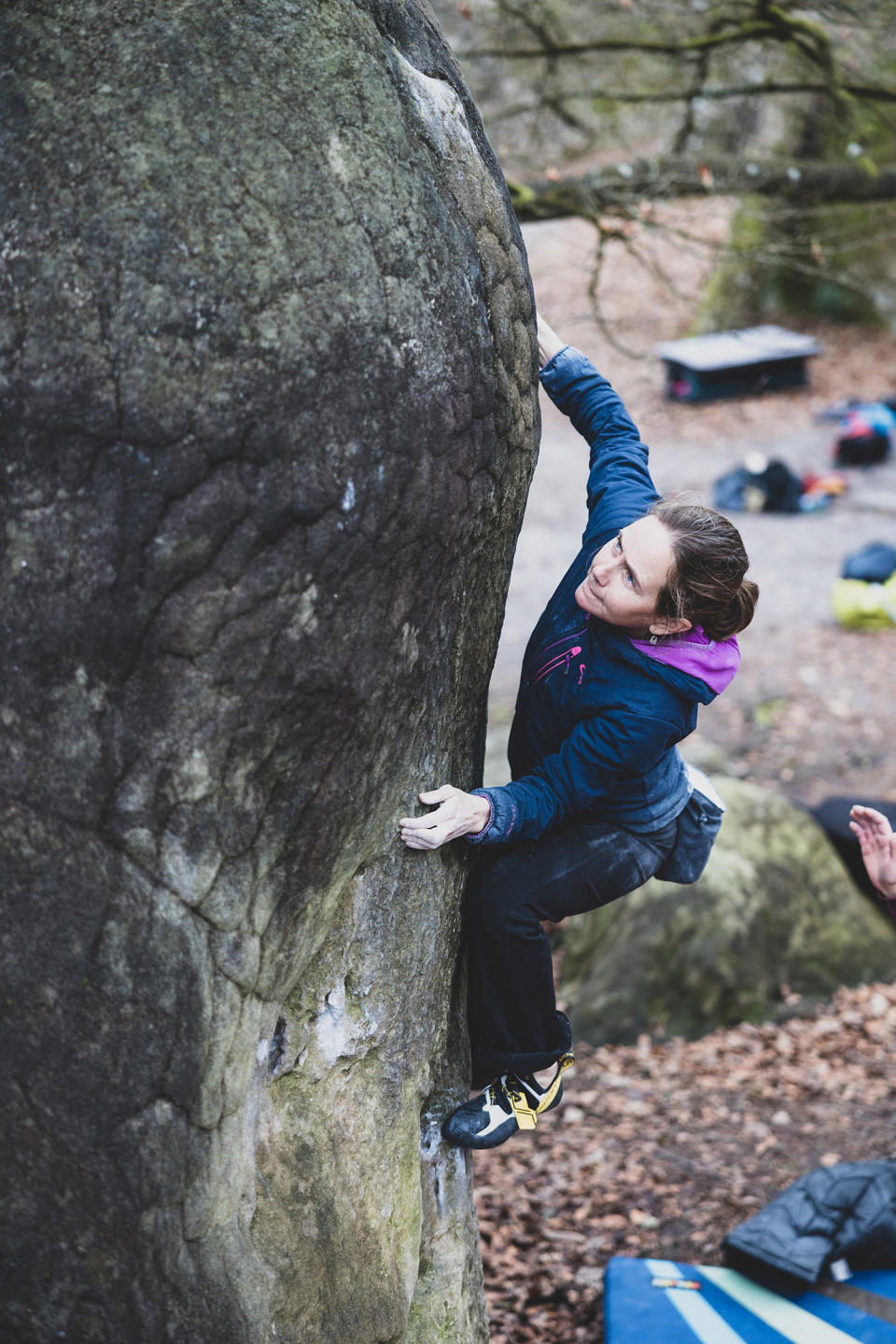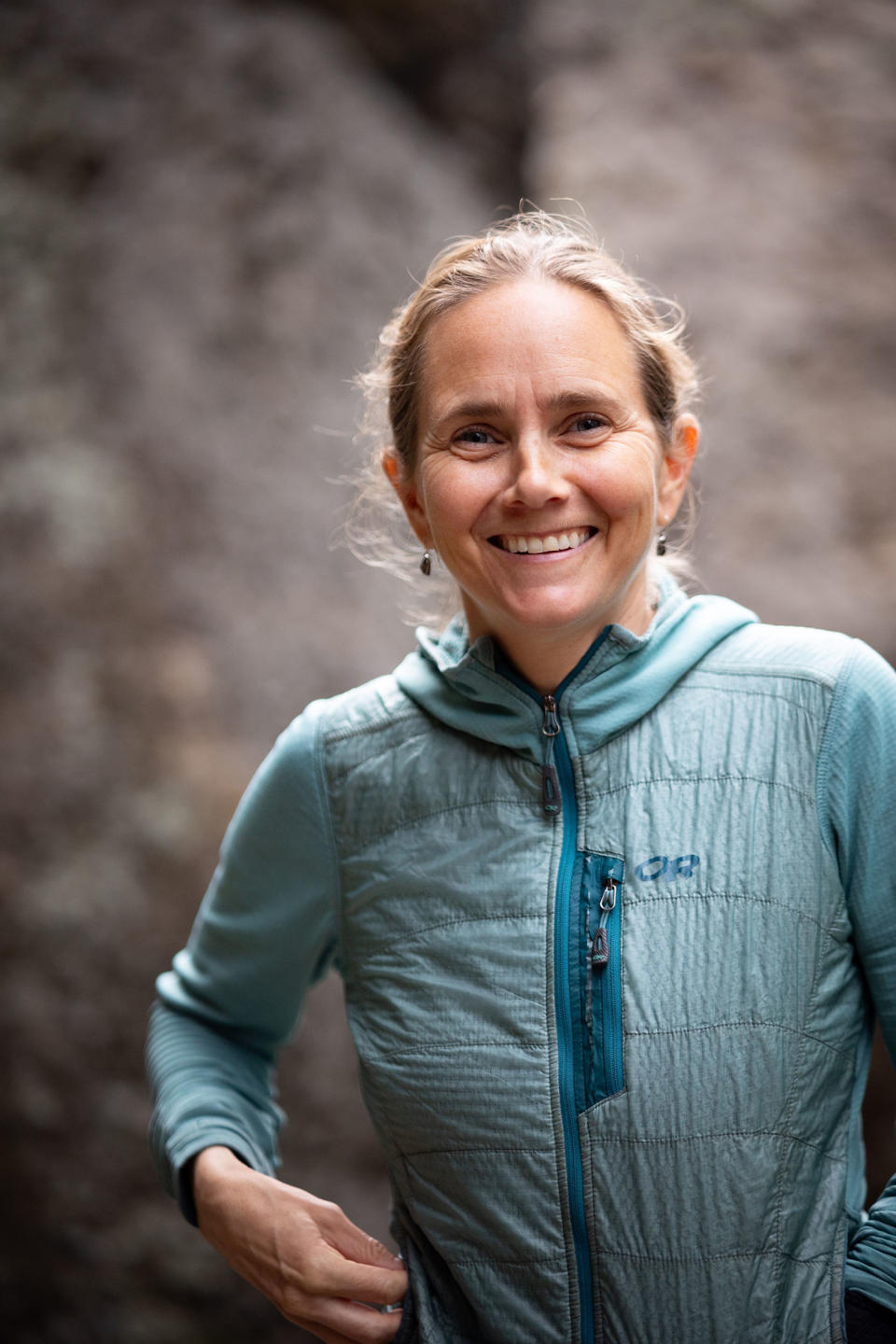The day I flew home after being kidnapped by terrorists on a rock-climbing trip
Beth Rodden is a professional rock climber who, along with three other climbers, was kidnapped and held hostage by Islamic militants in 2000 while on a climbing trip in Kyrgyzstan. The following is excerpted from her new memoir, “A Light Through the Cracks,” about the day she returned home to the U.S.
Amsterdam, August 2000
By the time my boyfriend, Tommy Caldwell, and I made it to Amsterdam’s gleaming, sterile airport, we had been passed along a half dozen times, like an important but increasingly well-worn package. Military helicopters had brought us and our other two climbing partners from base to base. We’d endured a surreal ride on a private jet from the last military base to the capital, Bishkek, traveling alongside the tipsy and jovial president of Kyrgyzstan. He’d patted us on the shoulders like a grandfather and claimed us long enough for a photo op and a speech to local media in a language we couldn’t understand. Then he handed the four of us off to the American embassy, which scrambled to find us flights home. A few days later, Tommy and I drove across the Kazakhstan border, in a hired car with a diplomatic escort, to the international airport in Almaty, and finally a commercial jet took us from Central Asia to the edge of the Atlantic. Now we had just one more flight to go.
Our tickets were a last-minute mess, and we needed to check on our connection. As we crossed the terminal, I carried a brown paper gift bag from the airport candy shop — despite what we’d been through, I still wanted to bring my older brother a present from this trip. I watched the families clustered around the gates, the lone business travelers perched at the bars, scanning each face around me. I’d been on edge through practically every step of the journey: The embassy in Bishkek had felt almost safe, but at the hotel where they’d sent us to get some sleep, I’d felt vulnerable and stayed vigilant.

In the airport, I was hungry again. When we’d made it to the second army base, the one that felt like a cluster of portable classrooms set down on a vast brown plain, we’d stuffed ourselves with barley and warm buttered bread, but I could not stay full. I had just eaten two chocolate croissants. Still, my stomach felt like a cavern. My brother didn’t really need a present, did he?
I ate half the chocolate in the bag before we got to our gate.
The line at the KLM Royal Dutch Airlines counter felt so orderly. The whole airport did. Just existing there felt like getting a big, soothing hug. When we’d boarded the flight in Kazakhstan, the passengers had formed no line. Everybody just pushed in a scrum toward the plane. Tommy and I stood frozen, like the good, shocked scouts that we were, and got lost in the flood. I felt so fragile, so extremely fragile, and so resigned to that fragile state.
We weren’t safe. That was obvious to me. No line, no order, no rule of law. I loved rules. People smoked openly on that first plane.
“Next,” the flight attendant said as we arrived at the counter. Her voice was as professionally cheerful as her uniform: light blue skirt, light blue jacket, white blouse underneath.
“We’re here to check in for our flight,” I said.
“Wonderful. May I please have your boarding passes?”
I mumbled something apologetic and handed her a few crumpled, dirty sheets of paper. “I think we have to get our seats and stuff from you.”
She pinched her brow as she read our mess of documents. She typed vigorously. I was sure this meant we weren’t going to make it home.
“Can you wait one second?” she asked, flashing a strained smile. She disappeared behind a wall.

I looked at Tommy. He stared into the blank space where the woman had just been. I couldn’t tell if he was as scared as I was, if he was also monitoring the people pooling and flowing around us for any threat. I felt like I had grown an invisible antenna that vibrated continually, never at rest. Never letting me rest. A memory tried to surface inside me: a body in silhouette, sailing off a dark cliff. A crunch, and an exhale. I forced it back down.
Two blond attendants now appeared where there had been one.
“Can you tell me: Was it something KLM did?” the new flight attendant asked.
I looked back at Tommy. Did he know what she was talking about? Did she know what had happened? Tommy shrugged.
“Wait, what?” I said. “What was something . . . ?”
“Well, um, how to say this,” the flight attendant said. “It says on your tickets, ‘Emotionally distressed passengers, please take care.’ So, we are just wondering if it’s something KLM did.” She looked concerned and defensive in her caring, like a hospital billing manager. She didn’t want to know the answer, but she had to ask.
I didn’t want a stranger to try to comfort me, but I did feel the need to comfort her. So I said, “Oh no, definitely not. We were just kidnapped and we want to go home.”
I couldn’t believe how easily the sentence came out. We were just kidnapped . . . I’d never said it so plainly before.
The flight attendant exhaled all her breath at once, stunned and relieved. “Well, good,” she said.
Well, good?
“KLM does our best. How about business-class seats for you two?” She printed our fresh, flat boarding passes. Tommy and I boarded the plane.
We ate every meal and every snack that was offered to us on the long ride home. My hunger was like a portal opened into a galaxy — infinite, absolute. When I was in middle school, I used to watch my older brother, David, eat, stunned by the mountain of food he could consume. Now, it felt strangely freeing to eat with that type of abandon. I hadn’t done that since ninth grade, when I became obsessed with climbing.
I could eat, but I still couldn’t sleep. My anxiety kept me wide awake, and my wakefulness in turn meant I had nothing but space and time for the anxiety to spin itself tighter in my body. I kept wondering if the plane would crash. That seemed possible, maybe even probable, given how the rest of our trip had gone. An appropriate ending, in a way. I wondered if I’d be scared. What would Tommy say to me before impact? Would it hurt? Our backpack, stuffed at our feet, was filled with souvenirs purchased in a blur during our strange interlude in Bishkek, between our flight with the president and our diplomatic drive across the border. I had stuffed the paltry remains of the airport chocolate into our bag alongside the rest of the things we’d acquired: a hand-carved wooden chess set, a wool hanging. Proof that we’d done something major and been somewhere cool. What were we thinking?

The backpack that sat at our feet had been lost in transit when we’d first landed in Kyrgyzstan, full of hope for our climbing adventure, and was waiting for us, perversely intact, at the hotel in Bishkek after our escape. We’d left San Francisco with 20 expedition duffels, and all I had left was this backpack filled with trinkets from a country to which I’d never return. Maybe that was why we’d bought them, with the money Tommy had wadded up in his sock just before we were marched away from our camp at gunpoint. Maybe it was some attempt to fabricate a decent memory of the place.
My hands trembled the whole 12 hours to San Francisco. I knew I needed sleep, but if the plane did crash, wasn’t I supposed to be awake for that? I had no idea how to act, what to do or say or who to be when we saw our parents. I’d left as a 20-year-old girl full of herself, ready for the world, sure I was doing something extraordinary. I was living out the dream I’d stared at in the posters I hung on my bedroom wall: climbing to incredible heights in far-off places. My mother had hardly traveled, certainly not by my age. I’d felt so awfully superior as I’d walked down the jetway when we left. I didn’t even turn back to wave.
My parents had given me everything — pride, freedom, confidence. They trusted me. They trusted my decisions. They trusted the world. Now I was returning home a broken mess. I’d spoken to them a few times from the embassy in Bishkek, the words mainly drowned in my tears. I wanted to be small again, so small I could crawl through the phone into their arms, where they’d hold me and shush me and stroke my head. I wanted my mother to say, “Mama’s here, Mama’s here,” just like she always did when I was a girl. I wanted to shrink back into that little-girl body and lay my head in her lap and cry.
Now — how to do this? How was I supposed to carry myself getting off the jetway? Was the idea to act strong, like I was fine? I was weirdly good at that. Or should I literally run into their arms, like I had been dreaming of doing for the past eight days? I’d never spoken easily with my parents about feelings. They were so kind, so present, and gently but firmly on my team. But inside, I always felt nervous, like there was a line I was afraid to cross, like I needed to be tougher, solid, unbreakable. And even if I could lay my head in my mother’s lap and have her say, “Mama’s here,” would that still work to soothe me? I was not the same person I had been when I left. My thoughts flapped like the loose end of a film in an old-fashioned movie projector, the front reel spinning empty.
I looked over at Tommy. Maybe he’d know what to do. His head was slumped at a 45-degree angle to his chest, his mouth dropped open, snoring. He was sick. His brain was more lucid and less spastic than mine, but his body was breaking down. He had a fever. I envied Tommy’s oblivion. I felt so alone.
We landed. My palms were sweating, but Tommy’s hands felt strong. That felt like a plan: I’d hold his strong hand and we’d present a united front, though I hadn’t told him about my looping, flapping mind. I was trying to stay composed — for him, for me, maybe for my parents too. We collected our bag of souvenirs from under the airplane seats. The souvenirs promised our trip was normal. We were normal. I grabbed a free chocolate bar and a package of cookies from the plane’s galley as we exited. I never did anything like that, but now instead of saying, “Don’t eat that, Rodden,” I thought, “Just in case we don’t have any other food.”
I didn’t race off the plane like I had seen people do in movies, straight into their loved ones’ arms. Instead I walked so slowly that other passengers started passing us. I was desperate to return home, to the narrow twin bed in my parents’ house, on our quiet block filled with minivans and white Honda sedans, to replant myself in the flat farmland around Davis, California, to recommit to the safe wide sidewalks. I just didn’t know how. I wondered if people could tell we’d changed: if we walked differently or stood slightly less straight, if we’d absorbed so much fear and terror that we now emitted it.
Excerpted from “A Light Through the Cracks: A Climber’s Story,” by Beth Rodden. © 2024 Published by Little A Books, May 1, 2024. All Rights Reserved.
This article was originally published on TODAY.com

